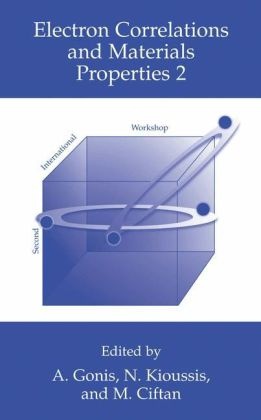Read more
This is the second in a series of "International Workshops on Electron Correlations and Materials Properties. " The aim of this series of workshops is to provide a periodic (triennial) and in-depth assessment of advances in the study and understanding of the effects that electron-electron interactions in solids have on the determination of measurable properties of materials. The workshop is structured to include exposure to experimental work, to phenomenology, and to ab initio theory. Since correlation effects are pervasive the workshop aims to concentrate on the identification of promising developing methodology, experimental and theoretical, addressing the most critical frontier issues of electron correlations on the properties of materials. This series of workshops is distinguished from other topical meetings and conferences in that it strongly promotes an interdisciplinary approach to the study of correlations, involving the fields of quantum chemistry, physics, and materials science. The First Workshop was held June 28-July 3, 1998, and a proceedings of the workshop was published by KluwerlPlenum. The Second Workshop was held June 24- 29,2001, and this volume contains the proceedings of that scientific meeting. Through the publications of proceedings, the workshop attempts to disseminate the information gathered during the discussions held at the Workshop to the wider scientific community, and to establish a record of advances in the field.
List of contents
Preface. Part 1: Experimental Indications of Correlation Effects in Materials. Pressure-Induced Effects in Magnetic Materials with F- and D-electrons; V. Syschovsky, et al. Electron Correlation and Plutonium Phase Diagram; C. Lawson, et al. Size and Interface Effects in Patterned Magnetic and Superconducting Thin Films; L.E. de Long, et al. Part 2: Phenomological Studies of Correlation Effects. Spectral Density Functional Approach to Electronic Correlations and Magnetism in Crystals; I. Lichtenstein, et al. Origins of Heavy Quasiparticles; P. Fulde. Orbital Properties of Vanadium Ions in Magnetically Ordered V 2 O 3 ; S.W. Lovesey, et al. Theory of Manganites; A. Moreo, E. Dagotto. The Kondo-Lattice Model for Cerium Compounds; B. Coqblin, et al. A Geometric Approach to Correlated Systems; J. Berakdar. On Sine-Gordon Vortices in High-Temperature Superconductors; O. Hudak. Spin Permutation at Work in the BCS Hamiltonian; J. Szeftel. Part 3: Ab Initio Studies of Correlation Effects. Electron Correlation From Molecules to Materials; R.J. Bartlett. Can Density Functional Theory Describe Strongly Correlated Electronic Systems? J.P. Perdew. Exchange-Correlation Energy as a Function of the Orbital Occupancies; P. Pou, et al. Base-Corrected Perturbation Theories of Intermolecular Interactions; A. Vibok, et al. What is Time-Dependent Density Function Theory? Successes and Challenges; N.T. Maitra, et al. Ensemble Hartree-Fock and Kohn-Sham Schemes for Excited States: The Optimized Effective Potential Method; N.I. Gidopoulos, et al. Density-Matrix Functional Theory and the High-Density Electron Gas; P. Ziesche. Toward the Construction of an Exchange-Correlation Potential in Electronic-Structure Calculation of Two-Particle States in Solids; A. Gonis. Electron Correlations in Disordered Alloys and at Metallic Surfaces; V. Drchal, et al. Quantal Density Function Theory; V. Sahni. Uniform Electron Gas from Two-Particle Wavefunctions; P. Gori-Giorgi. Density Functional Theory from the Extreme Limits of Correlation; M. Seidl. Ab Initio Study of Iron Magnetism along Bain's Path: Applications to Overlayers; M. Friak, et al. Index.
Summary
This is the second in a series of "International Workshops on Electron Correlations and Materials Properties. " The aim of this series of workshops is to provide a periodic (triennial) and in-depth assessment of advances in the study and understanding of the effects that electron-electron interactions in solids have on the determination of measurable properties of materials. The workshop is structured to include exposure to experimental work, to phenomenology, and to ab initio theory. Since correlation effects are pervasive the workshop aims to concentrate on the identification of promising developing methodology, experimental and theoretical, addressing the most critical frontier issues of electron correlations on the properties of materials. This series of workshops is distinguished from other topical meetings and conferences in that it strongly promotes an interdisciplinary approach to the study of correlations, involving the fields of quantum chemistry, physics, and materials science. The First Workshop was held June 28-July 3, 1998, and a proceedings of the workshop was published by KluwerlPlenum. The Second Workshop was held June 24- 29,2001, and this volume contains the proceedings of that scientific meeting. Through the publications of proceedings, the workshop attempts to disseminate the information gathered during the discussions held at the Workshop to the wider scientific community, and to establish a record of advances in the field.

